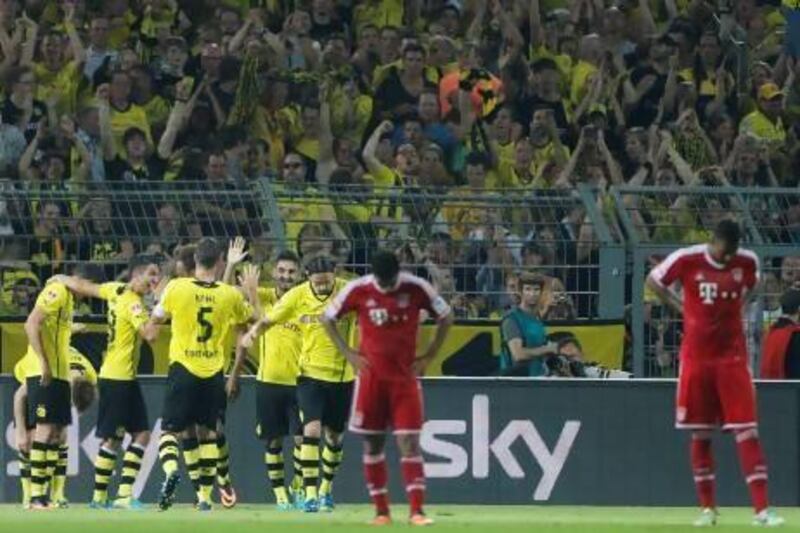Professional sport, by its very nature, polarises.
Brilliance is no guarantee of popularity. Tiger Woods, Cristiano Ronaldo, and the New York Yankees; all equally loved and despised.
At its worst, as in the fanatical world of football, it can foster genuine hatred.
There are exceptions, universally adored athletes like Phil Mickleson or Mo Farah.
But a football team?
Step forward Borussia Dortmund, everyone's new favourite club.
Last season, at home and in Europe, Jurgen Klopp's swashbuckling young team took on mighty Bayern Munich – and heartbreakingly fell short on both fronts. The world swooned.
On Saturday, Dortmund kicked off the new season with a wonderful destruction of Bayern in the German Super Cup. For once, more than a glorified friendly, the 4-2 win exacted a tiny measure of revenge for May's Champions League final defeat at Wembley.
Rarely would Bayern's new coach, Pep Guardiola, a veteran of Spain's clasico, have experienced an atmosphere like the one whipped up by Dortmund's famed Yellow Wall at the Westfalenstadion.
As he congratulated Klopp at the final whistle, he must have realised that it's not just the imposing memory of last season's trophy treble that he will have to wrestle with.
Borussia Dortmund are here to stay.
It's easy to fall for their charms. A colourful, noisy army of fans; an eccentric, idealistic coach; and a brand of football that marries the passing ideals of tiki-taka to a high-paced, pressing game the equal of anything Bayern or the English Premier League has to offer.
Not convinced yet?
How about the fact that the team that started the Champion League final cost a total of only US$45 million (Dh165m) in salaries. To put that in context, Ronaldo alone cost $130m (Dh477m) when he joined Real Madrid, the team thrashed by Dortmund in the semi-final. They have also had to contend with Bayern Munich's hoarding of Germany's best talent, in particular the signing of their own Mario Gotze, even before that London showdown was played.
Like the indie band that overcame the odds to make it big in the land of commercial, pop-music excess, Dortmund beat the system. They are the Nirvana of football.
And yet the image of Dortmund as a plucky underdog is a misleading one. It is a little more complicated than that.
At just over 80,000, Dortmund have the highest average attendance in Europe, more than closest rivals Manchester United (75,000) and Barcelona (73,000). In April, Forbes magazine ranked them the world's 14th-richest club in the world, valued at $394 million. Hardly numbers you associate with a new kid on the block.
On the pitch, they also have a modern pedigree. The 1997 Champions League was won by defeating then-holders Juventus, with Zinedine Zidane, Alessandro Del Piero et al.
It's the work that has been achieved under Klopp, however, that has transformed a club who, 10 years ago, came close to going out of business.
Bayern Munich may have snatched Barcelona's unofficial title as the world's best team last season, but it's easy to forget that Dortmund had won the two previous Bundesliga titles.
Despite that success and the massive gates, Dortmund, until recently at least, did not command the romanticism, or worldwide fan bases, of Manchester United, Liverpool, Barcelona or Real Madrid.
In the transfer market, Dortmund can't quite compete with the big boys. What they do is invest in potential: Robert Lewandowski joined in 2010; Marco Reus last year, and Henrikh Mkhitaryan from Shakhtar Donetsk this summer.
In that sense, they resemble the Olympique Lyon team of the turn of the century more than the big clubs they keep company, and often outclass, these days. Operating a transfer policy of economic prudence long before "Moneyball" came into fashion, Lyon won seven consecutive French titles (2002-2008) and reached the Champions League semi-final in 2010.
Dortmund went one better, and their modus operandi is now the envy of, and template for, many clubs around Europe.
The Liverpool manager Brendan Rodgers, for one, cited Dortmund's methods as the blueprint for getting back into the Champions League.
"You can challenge without spending £80m in one summer," Rodgers said in April. "Look at the example of Borussia Dortmund. A team that won the Champions League [in 1997] and then struggled financially. They went out and rebuilt and it took them four to five years to push on."
Dortmund's parallels with Rodgers's own club are obvious, as are the virtues of their system.
"There is no doubt you need investment to raise the bar and the quality, but while you are doing that there are other ways to try and get an advantage," Rodgers said.
Dortmund are an anomaly, an underdog and a big club at the same time, which is no bad thing. Their journey from being the football hipster's choice to mainstream adoration is as unexpected as it is refreshing.
In a sport hopelessly subservient to money, Borussia Dortmund offer an alternative.
Just like Nirvana.
Follow us
[ @SprtNationalUAE ]





